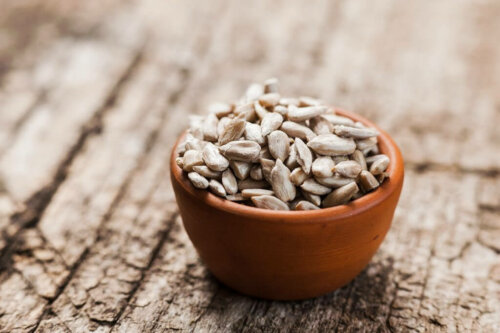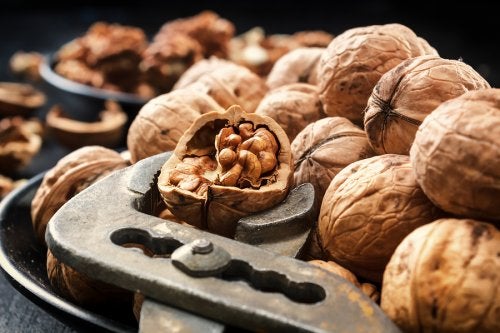Food that Improves Circulation: Eight Types

Food that improves circulation is important to have in your diet. This is because maintaining and improving circulation it is essential to prevent heart disease and be in overall good shape. In fact, cardiovascular diseases are currently the main cause of death in developed countries.
Blood flows throughout the body thanks to the circulatory system. Thus, nutrients and oxygen reach the cells and remove any waste. Throughout this article, we’ll explain the many properties of a series of foods we must consume if we care to improve your circulation.
Types of food that improve circulation
1. Lime and lemon

Citruses are rich in vitamin C, which is essential for the formation of collagen and elastin. These substances come in the form of protein and help shape the capillary wall.
Drinking lemon juice in the morning is a great way to improve your circulation. It’s even better if you consume some of the skin as it contains antioxidants. If you find it too acidic, use it as a dressing in your salads. The antioxidants this type of citrus contains will help reduce the oxidation of the LDL lipoprotein, which may be related to a lower risk of developing atheroma plaques.
2. Turmeric is one of the types of food that improves circulation
This food has anti-inflammatory properties, according to an article published by Molecules journal. Most of its benefits when it comes to improving circulatory health are due to turmeric’s antioxidant effect. It counteracts the action of free radicals and toxins in the body.
Normally, the body neutralizes naturally occurring free radicals but there are various forms of damage if there’s an excess in production such as:
- An increased risk of cardiovascular disease
- Also, it increases the risk of cancer
- It speeds up the aging process
- There’s a higher incidence of Parkinson’s, Alzheimer’s, arteriosclerosis, and diabetes
3. Ginger is one of the types of food that improve circulation
Frequent and habitual consumption of ginger helps boost energy and activates blood circulation by thinning the blood. Nutritionists recommend consuming it daily, either fresh or in its powder form. You can add it to sauces, vegetable creams, and as an infusion.
You may also be interested in reading Improve Blood Circulation with Natural Remedies
4. Sunflower seeds

These nuts, in addition to providing essential fatty acids, are rich in vitamin E. This is characterized by its great antioxidant activity and it’s one of the most powerful. Consuming one tablespoon of sunflower seeds every day will help you meet your vitamin E requirements and will also improve your circulatory health.
Also, the omega 3 fatty acids contained in these foods contribute to reducing systemic inflammation, thus reducing cardiovascular risk according to one study.
5. Garlic
This food has anticoagulant properties. Thus, it helps the blood circulate better and prevents the formation of clots. It promotes blood circulation, just as its cousin the onion.
To fully obtain its health benefits, try to consume one clove of raw garlic a day. This is because this is the only way to prevent the degradation of inulin, its active component.
6. Drink water to improve circulation
Drinking plenty of water is great for improving circulatory health as well as for other body functions. You may already know it’s essential for most life forms.
Water helps eliminate toxins from the body, which undoubtedly improves circulatory health and prevents the formation of clots. Thus, try to drink between one and a half to two pints (6-8 glasses) a day to keep your body well hydrated. This also helps to transport all the necessary nutrients to your organs and tissues.
7. Walnuts

These nuts have a high content of vitamin B3, which helps improve blood circulation. Furthermore, their fatty acids counteract cholesterol and inflammation in the circulatory system.
8. Tomatoes, watermelon, and cantaloupe
These foods contain lycopene, an antioxidant that stimulates blood circulation and prevents heart problems, as well as the oxidation of LDL lipoprotein. Also, tomatoes also help prevent vascular diseases such as arteriosclerosis and prevent the formation of fat ion in the blood.
Read also: Four Natural Remedies for Blood Circulation
Other recommendations to improve circulation

Of course, you must maintain a proper diet to be in good health and prevent illness and disease. However, you must also adopt a series of healthy habits such as regular physical activity and frequent water intake, as we mentioned above.
You can also:
- Elevate your legs several times a day to reduce swelling.
- Avoid wearing tight clothes.
- Consume foods high in potassium, which helps eliminate water through the kidneys and prevents blood pressure imbalances.
Optimize your diet by eating food that improves your circulation
Apart from the aforementioned foods, many others can also improve your circulation. As you can see, there’s no excuse not to include them in your diet and adopt a healthy lifestyle. You’ll feel much better about yourself and prevent cardiovascular disease.
Finally, keep in mind that exercising is essential to prevent cardiovascular disease, so get moving!
All cited sources were thoroughly reviewed by our team to ensure their quality, reliability, currency, and validity. The bibliography of this article was considered reliable and of academic or scientific accuracy.
- He Y., Yue Y., Zheng X., Zhang K., et al., Curcumin, inflammation and chronic diseases: how are they linked? Molecules, 2015. 20 (5): 9183-213.
- Watanabe Y., Tatsuno I., Omega 3 polyunsaturated fatty acids for cardiovascular diseases: present, past and future. Expert Rev Clin Pharmacol, 2017. 10 (8): 865-873.
This text is provided for informational purposes only and does not replace consultation with a professional. If in doubt, consult your specialist.








